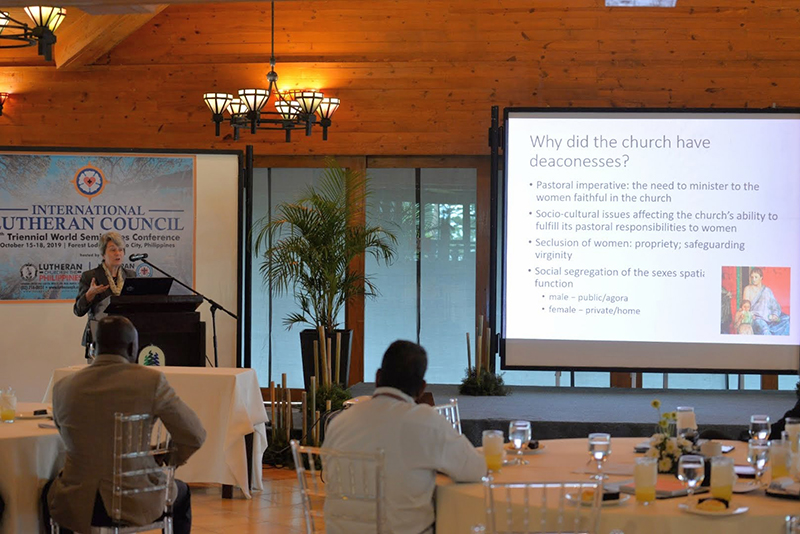
Dcn. Dr. Cynthia Lumley speaks during the 2019 World Seminaries Conference.
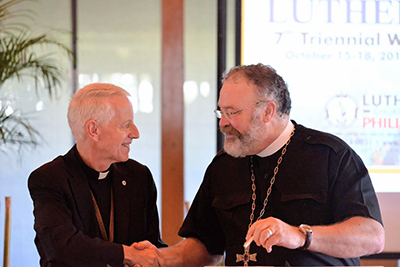
ELKB President Gijsbertus van Hattem and LCMS President Matthew Harrison sign an agreement for altar and pulpit fellowship between their two church bodies.
PHILIPPINES – Thursday saw the ILC 2019 World Seminaries Conference’s final presentation on the conference theme, before transitioning the conclusion of the conference theme before transitioning to the second topic of the conference: a common-ground Lutheran curriculum for theological education.
Following morning devotions, President Matthew C. Harrison of The Lutheran Church—Missouri Synod and President Gijsbertus van Hattem of the Evangelical Lutheran Church in Belgium (Evangelisch-Lutherse Kerk in België) took the opportunity to sign a protocol document finalizing altar and pulpit fellowship between their respective church bodies.
ILC Chairman Hans Jörg Voigt then announced that Rev. Dr. Timothy Quill has been appointed the new General Secretary of the International Lutheran Council.
Latin American Context
The morning saw the fifth and final presentation under the theme of “Confessional Lutheranism: Doctrinal Identity in Different Cultural Contexts.” Rev. Samuel R. Fuhrmann of the Evangelical Lutheran Church of Brazil (Igreja Evangélica Luterana do Brasil – IELB) brought a Latin American perspective to the topic, speaking on “Ecclesial Lutheran Identity and the Church’s Mission in the Face of the Reality of Favelas.”
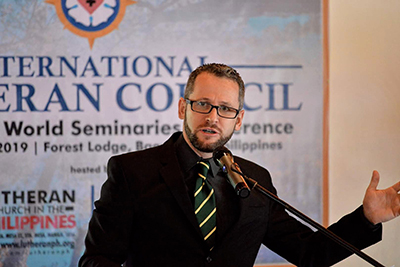
Rev. Samuel R. Fuhrmann speaks on missions in the favelas of Brazil.
In explaining the history of favelas, Rev. Fuhrmann noted that they are “an urban built environment where one encounters a rich ethnic and cultural diversity, and often the problems of violence and poverty.” The Brazilian Lutheran church by contrast was founded by immigrants in a rural setting. While the IELB is present in urban centres today, Rev. Fuhrmann said, “one of the challenges is that the church needs to cross cultural, social, and even geographic boundaries to fully account for the reality of favelas in its mission practices.”
Christians are called to a “cruciform engaged presence in the world,” said Rev. Fuhrmann, which is “related to God passively and related to others and the world actively.” The latter—relations with others on a horizontal level—must often be contextualized to recognize differences in culture. “If congregations neglect the horizontal dimension of the cruciform life and the characteristics of our humanity,” Rev. Fuhrmann warned, “this neglect hinders the distinctive task of the Church: the preaching of the Gospel.” In the case of missions in favelas especially, it is necessary to recognize and embrace the deeply relational life which is the core of favela culture, in which spaces are made for frequent socialization and people support one another in the midst of challenges like poverty and violence.
A Lutheran Curriculum for Theological Education
During the rest of the day, attention turned to the second focus of the event: an exploration of what a common-ground Lutheran curriculum for theological education recognized by all ILC member churches would look like. Rev. Dr. Werner Klän of Germany and Rev. Dr. Timothy Quill, the ILC’s new incoming General Secretary, moderated discussion of the theme, and multiple presenters provided insight.
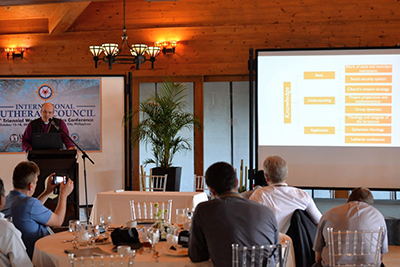
Bishop Hanss Martin Jensons reports on a confessional Lutheran education conference in Latvia.
Rev. Dr. Stephen Schumacher presented on “A Lutheran Curriculum for Theological Education.” A basic foundation is important for all levels, he said, but learning styles may vary. African students for example learn by watching, copying, and repeating. Research indicates that, for theological education in Ghana, several areas need reinforcement, including a more in-depth study of pastoral theology. At the same time, a biblical and confessional structure is necessary, he said. Dr. Schumacher is a LCMS missionary and theological educator at the seminary of the Evangelical Lutheran Church of Ghana.
Rev. Dr. Alexey Streltsov reported on “Lutheran Seminary Curriculum: Challenges and Opportunities.” He suggested that one or two years of training is inadequate for proficiency in Scripture and theology, and that residential training is the best way to go. He then provided several challenges and suggestions for theological education, finally reporting on the curriculum that is used in their seminary. Dr. Streltsov is rector of Lutheran Theological Seminary in Novosibirsk, Russia, the theological institute of the Siberian Evangelical Lutheran Church.
In the second session of the afternoon, Dr. Klän led a discussion of “A Lutheran Curriculum for Theological Education.” He summarized the findings of the ILC’s 2001 conference on this theme, and then reported the results of a new questionnaire on curriculum sent to ILC seminaries. Those that responded reported student populations ranging from six students to 615, and faculties from three to 34. A recurring challenge noted in the results are recruitment and enrollment. Most of the seminaries responded that they would like to see a common curriculum, although two said it was not possible or advisable.
Bishop Hanss Martin Jensons of the Evangelical Lutheran Church of Latvia reported on a meeting on Confessional Lutheran Church Education which was held March 26-28, 2019 in Latvia. Eight entities from around Europe were represented and they discussed the minimum standard for theological education, as well as how to facilitate mutual recognition and the possibility of one educational program in the future with combined resources. They are also investigating the idea of developing an English language distance learning program. Bishop Jenson explained how, at Latvia’s Luther Academy, they began with the Professional Standard, and from there worked toward the Educational Standard, and then to Curriculum. The worked through the knowledge, skills and competencies necessary for the pastoral officeholder.
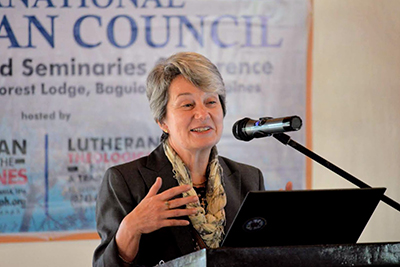
Dcn. Dr. Cynthia Lumley speaks on the diaconate during the ILC’s 2019 World Seminaries Conference.
Later in the day, Dcn. Dr. Cynthia Lumley gave a presentation on the history of deaconesses and their service in the church today. Dr. Lumley is principal of Westfield House in Cambridge, England, the theological institution of the Evangelical Lutheran Church of England.
Rev. Dr. Douglas Rutt presented on the topic: “Mission in the Age of Migration.” He emphasizes that much of contemporary missiological literature deals with the fact that there are 272 million refugees and immigrants in the world today, and these movements are resulting in the expansion of the gospel worldwide. Dr. Rutt is Provost and Professor of Practice Theology at Concordia Seminary in St. Louis, Missouri—a theological institution of The Lutheran Church—Missouri Synod.
After the various presentations, there was time for plenary discussion. Questions of expected workload were reflected on, including the expected workload of faculty members. Some highlighted that legitimate diversity needs to be taken into consideration. It was suggested that the starting point should be the description or characteristics of a Lutheran pastor. A further question was whether there was the possibility of a mutual accreditation program for the institutions of member churches of the International Lutheran Council.
The results of these discussions and are to be drafted into a concluding statement or resolution which will be commended to the ILC Seminary Relations Committee for further consideration.
The day ended, as it began, with worship.
———————
